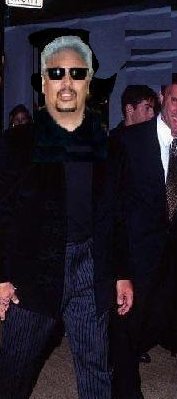 SPRINGFIELD - Where in the world is Frankie A. Roche?
SPRINGFIELD - Where in the world is Frankie A. Roche?The admitted gunman in the 2003 gangland-style shooting of crime boss Adolfo "Big Al" Bruno, has kept a decidedly low profile since pleading guilty to murder in April.
Roche, 35, has not made a single public court appearance since then, despite the fact that he stands charged in U.S. District and Hampden Superior courts for the same crime.
Most recently, his two codefendants in state court, Fotios A. "Freddy" Geas, 42, and Brandon D. Croteau, 30, appeared Dec. 18 in shackles for a pretrial conference on murder conspiracy charges. Roche was not present.
Assistant District Attorney Carmen W. Picknally said Roche is still charged in both state and federal courts, but declined further comment.
On a prison search Web site, Roche is said to be in custody at the Souza-Baranowski maximum security state prison in Shirley. However, others say he has been behind bars at the Hampshire
County jail and more recently at the Franklin County jail. But, Franklin County Sheriff Fredrick B. McDonald this week said Roche was no longer at that site.
He did his thing ... but now he's gone," McDonald said in response to an inquiry.
Similarly, in Roche's federal case, there has not been a single filing since May, when a transcript of the defendant's guilty plea a month earlier was posted. He has not been scheduled for sentencing, nor has a trial date been set in the state case, which is still pending against him.
Roche waited for Bruno outside an Italian-American social club in the city's South End on Nov. 23, 2003, according to Assistant U.S. Attorney Todd E. Newhouse.
After about a half-hour wait in a dark parking lot, Roche heard Bruno's voice and called out "Hey, Al!," according to the prosecutor. Bruno, the regional head of the New York-based Genovese crime family, responded: "Hey, buddy."
Roche shot Bruno six times and took off on foot, Newhouse said. He later told investigators it was a contract hit. The gunman said he was paid $10,000 by rival gangsters wrestling for power.
Investigators say Geas, previously identified as "the muscle" for Bruno's eventual successor, Anthony J. Arillotta, paid Roche; and Croteau, something of a hapless fringe character, helped Roche get out of town.
Geas was indicted in federal court after Roche pleaded guilty; he is held without bail. Croteau is serving a 15-year prison sentence on unrelated drug trafficking charges.
After Bruno was killed, investigators quickly got a line on Roche, but tracked him for months before he was apprehended by FBI agents while hiding out in Florida the following August.
The arrest was no less eventful than what preceded it: Roche was accidentally shot by agents during the raid.
He sued the FBI in connection with the shooting last year. The civil suit in U.S. District Court in central Florida seems to be the only thing visibly progressing through the court system.
Mark A. Sylvester, a Miami lawyer representing Roche in the civil suit, said he is embroiled in negotiations with the federal government and may not settle out of court. A trial date has been set for Aug. 31 in central Florida.
"I believe that the evidence in this case will show that a series of errors were committed by FBI personnel during the arrest," Sylvester said in an e-mail on Friday. "Those errors culminated with the accidental and wrongful discharge of an M4 carbine rifle into the back of Frankie Roche as he lay face down on the ground surrounded by multiple armed agents."
Roche could use a substantial award in that case, as he also faces a $1 million fine under his plea agreement with federal prosecutors.
In exchange for testimony against others in the Bruno case and other investigations, prosecutors declined to pursue capital punishment and may argue for a substantial reduction in an otherwise mandatory life sentence he faces as a result of his guilty plea in federal court here.
Geas may face the death penalty if he's convicted in the federal court case. Croteau has not been charged there.
http://www.masslive.com/news/index.ssf/2008/12/bruno_shooter_laying_low.html


200.jpg)



